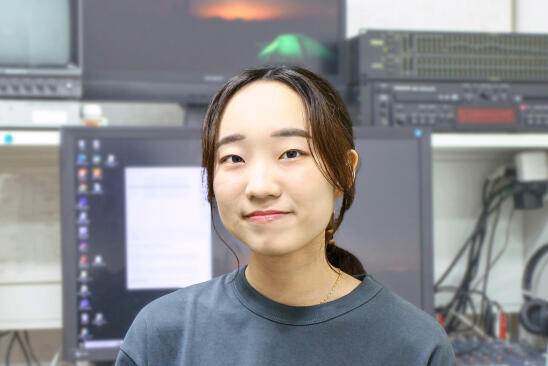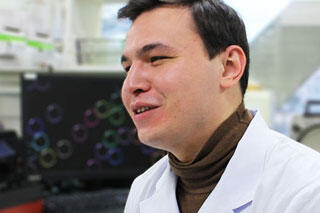-
 Student life2023.10.03Karen ShibayamaMy research primarily revolves around elucidating the neural underpinnings of acquiring relative pitch using functional brain imaging. While there are established assessment and training methods for absolute pitch, relative pitch, to some extent, is cultivated through daily musical activities, yet the specifics remain elusive. Relative pitch holds particular significance in music comprehension, as it forms the foundation of the relational aspects between musical pitches. In our experiments, we administer various behavioral tests, including tasks related to auditory perception, while simultaneously monitoring the participants’ brainwave activity. I engage in experiments every day, anticipating the discernible shifts in brain activity that stem from our training sessions.
Student life2023.10.03Karen ShibayamaMy research primarily revolves around elucidating the neural underpinnings of acquiring relative pitch using functional brain imaging. While there are established assessment and training methods for absolute pitch, relative pitch, to some extent, is cultivated through daily musical activities, yet the specifics remain elusive. Relative pitch holds particular significance in music comprehension, as it forms the foundation of the relational aspects between musical pitches. In our experiments, we administer various behavioral tests, including tasks related to auditory perception, while simultaneously monitoring the participants’ brainwave activity. I engage in experiments every day, anticipating the discernible shifts in brain activity that stem from our training sessions. -
 Student life2023.09.26Alfi Raudatil JannahMy laboratory focuses on neurodegenerative diseases. We work on clinical and molecular genetic researches. My current research interest is around tauopathies. Tauopathies are clinically, morphologically, and biochemically heterogeneous. They are characterized by the aggregation of tau into paired helical filaments (PHFs) and neurofibrillary tangles (NFTs). Using biosensor cells, my research focuses at the tau seeding capacity of certain tauopathies; comparing from one tauopathies to another and from one brain region to another using proteomic approach.
Student life2023.09.26Alfi Raudatil JannahMy laboratory focuses on neurodegenerative diseases. We work on clinical and molecular genetic researches. My current research interest is around tauopathies. Tauopathies are clinically, morphologically, and biochemically heterogeneous. They are characterized by the aggregation of tau into paired helical filaments (PHFs) and neurofibrillary tangles (NFTs). Using biosensor cells, my research focuses at the tau seeding capacity of certain tauopathies; comparing from one tauopathies to another and from one brain region to another using proteomic approach. -
 Student life2023.09.20Chihiro YagiMy professor in the Department of Otorhinolaryngology Head and Neck Surgery mentioned a proposal to conduct research on the relationship between the sense of balance and brain functions with the assistance of BRI researchers. I believed that being involved in research at BRI would provide me with invaluable experience.
Student life2023.09.20Chihiro YagiMy professor in the Department of Otorhinolaryngology Head and Neck Surgery mentioned a proposal to conduct research on the relationship between the sense of balance and brain functions with the assistance of BRI researchers. I believed that being involved in research at BRI would provide me with invaluable experience. -
 Student life2022.11.01Kohei IkarashiMy research focuses on the mechanism to reconstruct neural circuits following stroke. Stroke causes damage to neural circuits of the brain and spinal cord, resulting in various aftereffects. Our lab studies
Student life2022.11.01Kohei IkarashiMy research focuses on the mechanism to reconstruct neural circuits following stroke. Stroke causes damage to neural circuits of the brain and spinal cord, resulting in various aftereffects. Our lab studies -
 Student life2022.11.01Natsuki AkiyamaMy major research interests are cerebral ischemia, tau protein accumulation, and neuroprotection. Stroke causes dynamic changes in the brain. Cerebral infarction causes motor paralysis, speech impairment, and cognitive decline, and these symptoms are the result of dynamic environmental changes in the brain after the infarction.
Student life2022.11.01Natsuki AkiyamaMy major research interests are cerebral ischemia, tau protein accumulation, and neuroprotection. Stroke causes dynamic changes in the brain. Cerebral infarction causes motor paralysis, speech impairment, and cognitive decline, and these symptoms are the result of dynamic environmental changes in the brain after the infarction. -
 Student life2021.10.01Kazuki KoderaParkinson's disease and autism spectrum disorder are the key focus of my research. I analyze a gene whose function is not yet understood. This gene may be related to the pathogenesis of Parkinson's disease and I repeat steadily basic molecular biology experiments. As for autism research, I'm looking for ways in which the characteristics of zebrafish can help us to understand the mechanisms of autism.
Student life2021.10.01Kazuki KoderaParkinson's disease and autism spectrum disorder are the key focus of my research. I analyze a gene whose function is not yet understood. This gene may be related to the pathogenesis of Parkinson's disease and I repeat steadily basic molecular biology experiments. As for autism research, I'm looking for ways in which the characteristics of zebrafish can help us to understand the mechanisms of autism. -
 Student life2021.02.01Shoji SaitoMy research interest is to elucidate the pathophysiology of cerebral vascular disease and to establish a novel treatment. I generate genetically modified model mice for diseases using transgenic mice and viral vectors and analyze them.
Student life2021.02.01Shoji SaitoMy research interest is to elucidate the pathophysiology of cerebral vascular disease and to establish a novel treatment. I generate genetically modified model mice for diseases using transgenic mice and viral vectors and analyze them. -
 Student life2021.02.01Ramil GabdulkhaevResearch in our lab is concentrated around the pathology of the diseases of the human nervous system. The area is quite broad and includes a study of neurodegenerative diseases, neoplastic processes, various malformations, and autoimmune diseases, to name a few. My current research interest is around neuropathology of REM sleep behavior disorder (or RBD).
Student life2021.02.01Ramil GabdulkhaevResearch in our lab is concentrated around the pathology of the diseases of the human nervous system. The area is quite broad and includes a study of neurodegenerative diseases, neoplastic processes, various malformations, and autoimmune diseases, to name a few. My current research interest is around neuropathology of REM sleep behavior disorder (or RBD).
1





